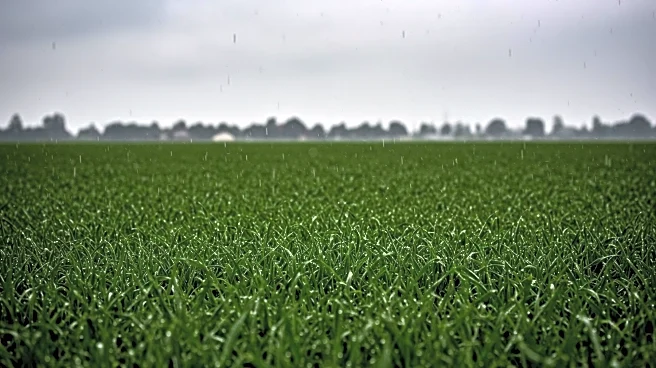What's Happening?
Recent isolated rainfall and storm events across Manitoba have significantly slowed the harvest process for various crops. Rainfall accumulations ranged from 4.0 mm to 107.4 mm, with the highest recorded at Minitonas. The Southwest region experienced beneficial rainfall for longer-season crops, but wet conditions have hindered the harvest of fall rye and winter wheat. Spring cereals are turning, and some harvest has begun, but producers are waiting for better weather conditions. In the Northwest, precipitation has similarly delayed harvest progression, with fall rye and winter wheat harvest underway in some areas. Canola crops are in the pod-filling stage, and soybeans are approaching the R5 growth stage. Cooler temperatures have slowed plant growth and maturity, impacting the overall harvest timeline.
Why It's Important?
The delay in harvest due to rainfall can have significant implications for Manitoba's agricultural sector. Timely harvest is crucial for maintaining crop quality and yield, and prolonged wet conditions can lead to lodging and other issues that affect crop health. This situation may impact local farmers' revenue and the broader agricultural economy in the region. Additionally, the delay could affect supply chains and market prices for crops like wheat, barley, and canola, which are important for both domestic consumption and export. The variability in weather patterns underscores the challenges faced by farmers in adapting to changing climate conditions.
What's Next?
Farmers in Manitoba will need to monitor weather conditions closely and adjust their harvest strategies accordingly. Improved weather conditions are necessary for the continuation of harvest activities, and producers may need to employ pre-harvest applications to manage crop maturity. The agricultural community may also seek support from local government or agricultural organizations to mitigate the impact of delayed harvests. Long-term strategies may include investing in infrastructure or technology to better manage unpredictable weather patterns.
Beyond the Headlines
The current situation highlights the broader issue of climate variability and its impact on agriculture. As weather patterns become less predictable, farmers may need to adopt more resilient farming practices and technologies. This could include diversifying crop types, investing in irrigation systems, or utilizing data-driven approaches to optimize planting and harvest schedules. The ongoing challenges also raise questions about the sustainability of current agricultural practices and the need for policy interventions to support farmers in adapting to climate change.











